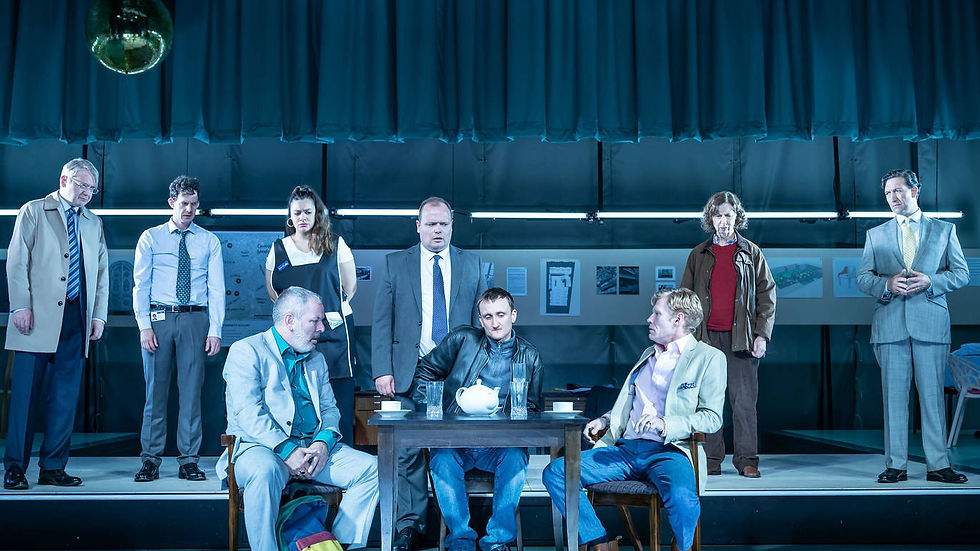'A Very Expensive Poison': An Overindulgent Portrayal Of Russian Politics
- Megan Williams
- Sep 30, 2019
- 3 min read
A Very Expensive Poison is a play steeped in political melodrama. John Crowley’s directing deftly highlights the absurdity of the Litvinenko poisoning with an avant-garde flourish, while Prebble’s quick and witty dialogue handles the fallout after the murder with great care. This establishes a moving portrait of the last weeks in the life of Alexander Litvinenko (Tom Brooke), a former officer of the FSB and the KGB. Marina Litvinenko (MyAnna Buring) is the warm central focus of the play, and bizarre political shenanigans ensue through her earnest search for justice. The relationship between Marina and Alexander in particular, is sweet and compelling.

Photograph by Marc Brenner
We open in a London café, minimalist in its staging. The waitress is reading a newspaper and occasionally fills the shelves with sandwiches. Two figures are talking, who we come to learn are a police inspector and Marina Litvinenko. A man, seated behind the main action, is revealed to be Alexander Litvinenko himself. Throughout the play, food is a central theme. Repeatedly, the murderers Andrei Lugovoy (Michael Shaeffer) and Dmitry Kovtun (Lloyd Hutchinson) joke: ‘London has become a world-class city since the food got good’. The foray of London cuisine is dabbled in by the Russian elites, who treat the city as a playground as well as a centre of investment and intrigue. It is in this brave new (gentrified) world that these men can carry out their flamboyant assassination. After all, it is the tea laced with poison—the symbol of wretched Englishness—that eventually kills Litvinenko. Polonium-210 is introduced as a radioactive substance, referenced through absurd elements—puppetry, music, glamour and an expedition around London’s innards, be that hospitals, expensive restaurants or, most importantly, hotels.
Along with their ignorance, cruelty, and incompetence, these men scatter radioactive material wherever they go. Prebble’s interpretation demotes the KGB officers to slapstick figures, as they play out their messy schemes as if they were inevitable. They are the Rosencrantz and Guildenstern to Litvinenko’s Hamlet. Tragedy and comedy remain in constant chaotic balance, and continuously spill into each other with disastrous consequences.
Putin (Reece Shearsmith) is introduced at the end of Act 1, and throughout Act 2 breaks the fourth wall to serve as a corruption-wielding, suit-wearing, all-round evil and generally unreliable narrator. He is a camp supervillain, which, given the repressive LGBT laws in Russia, is a problematic take on the tyrant. Such a presentation serves to rob him of the hyper-masculinity which permits him to command power and attention, but using this as a mode of critique implicitly reinforces an outmoded and toxic perspective. Despite this, the character is acted with great skill. One very moving moment involved Putin’s monologue nonchalantly dismissing the Moscow Theatre hostage crisis of 2002; the insouciance of his address is offset by the sudden shift of tone when it is revealed the extent of the horror of what had happened. Again, symmetry is central. Prebble tells us, bluntly, it is not okay to sit comfortably.
And yet, I couldn’t help but feel a lack of nuance in the play’s representation of this murder—it fails to develop beyond the central notion that this was A Bad Thing to have happened. Thematic resonance beyond this amounts to a criticism of Putin and the Kremlin, but not much else. Rather than questioning the liberal assumptions of the Old Vic’s predominantly older middle-class audience, Prebble indulges them. For example, Buring and Brooke shift effortlessly between Russian and English accents as a point of contact between countries and cultures; British accents are used when the Russian characters are speaking Russian, while Russian accents are used when they speak English. The directorial choice is useful in establishing comparisons and encouraging empathy, and also serves to showcase the intertwined narratives of Britain and Russia. But in positioning the Litvinenkos as honorary English people, the audience themselves is perhaps patronised and flattered excessively. In light of the more recent poisoning in Salisbury in 2017, it would have been interesting to hear a perspective that extends beyond Luke Harding’s 2013 non-fiction novel.
Despite some issues, the play remains powerful and moving. Directly addressing a very specific audience is perhaps an unavoidable by-product of breaking the fourth wall. Prebble’s adaptation is fast-moving, with occasional bursts of musical interludes that are explosive and intriguing. Through the fusion of vibrant lighting and innovative staging, the tumultuous post-Cold War political climate is explored, and the recent past is revealed to us. Hopefully A Very Expensive Poison won’t have a half-life on the London stage!
Edited by Alexia McDonald, Digital Editor

































